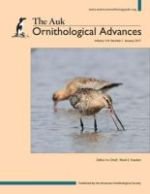The American Ornithologists' Union is honored to present the 2016 Elliott Coues Award to Dr. Michael Sorenson, a professor at Boston University.
After obtaining a B.A. in biology from Luther College in Iowa in 1984, Sorenson earned his Ph.D. in ecology, evolution, and behavior from University of Minnesota, Minneapolis, in 1990. As a graduate student he studied facultative brood parasitism in ducks, developing what has been adopted as the central hypothesis-testing framework for studying brood parasitism. He conducted postdoctoral work at the U.S. National Zoological Park in the Conservation and Research Center, as well as in the Molecular Genetics Laboratory from 1990 to 1995, and finished his postdoctoral career at the University of Michigan Museum of Zoology in 1995 to 1997. He became a faculty member at Boston University in 1998 and has been heavily involved in the biology department and in the university at large. He has taught courses ranging from introductory biology to molecular ecology and population genetics.
Sorenson is an internationally recognized leader in two fields of ornithology: the evolutionary causes and consequences of avian brood parasitism, and molecular evolution and systematics. He is prolific and influential in both of these subjects, having published more than 100 papers that together have been cited more than 7,500 times.
Sorenson has made several fundamental contributions to the study of avian brood parasitism, a research area that has remained a hot topic for both ornithologists and evolutionary biologists over the past several decades. Sorenson's dissertation work examined the functional significance of interspecific brood parasitism by Redheads on Canvasbacks. As facultative parasites, Redheads are of particular interest because they engage in both regular nesting behavior and interspecific brood parasitism like cuckoos and cowbirds. Armed with video cameras that documented the egg-laying behavior of individually marked females, Sorenson pieced together an exceptionally clear picture of which females engage in brood parasitism and why. He developed a conceptual life-history framework that integrated nesting, and the various contexts in which females engage in brood parasitism, into a continuum of reproductive investment. The framework not only admirably explained the patterns of parasitism by female Redheads but has also been adopted as the central hypothesis-testing framework for the study of brood parasitism within species. With the Redhead study system, he also provided perhaps the first experimental evidence that a consequence of brood parasitism is that parasitic offspring can imprint on the wrong species, a factor that could affect the evolution of obligate brood parasitism.
Since his dissertation, he has continued to make diverse contributions to the study of brood parasitism. Studying a few different obligate brood-parasitic taxa, Sorenson and his collaborators showed how mating behavior and mechanisms of mate choice profoundly influence how selection favoring host specialization plays out. A study of cuckoos from Japan showed why mating system matters to the evolution of specialization and answered the long-standing question as to why we see genetic lines of host-specialist cuckoos rather than speciation into host-specialized species of brood parasites. The genetic study (published in Nature) showed that while female cuckoos are faithful to a given host species and lay eggs that mimic those of their particular host, male cuckoos mate randomly with respect to female host type. Male mating behaviors thus prevent speciation into species that specialize on particular hosts. Working with another parasitic group, the viduine finches, Sorenson revealed the conditions under which patterns of host use can lead to speciation in the parasites. In these parasitic finches, both males and females imprint on the songs of their hosts as chicks, which provides a simple mechanism to ensure reproductive isolation with switches to new hosts. This influential Nature paper also provides a rare but persuasive example of sympatric speciation.
In part to help us understand the evolution of brood parasitism, Sorenson developed considerable expertise in molecular ecology, phylogenetics, and genomics, contributing both analytical techniques and computer programs, as well as tackling a variety of phylogenetic problems in diverse avian clades. His molecular work constitutes more than half of his highly cited papers, an indication of his impact on that field as well. Two examples highlight both the diversity and the quality of that work. First, in a paper that has just come out (2016) in Molecular Ecology and Evolution, he uses a newer genomics method (ddRAD-seq) to perform a phylogenetic analysis of two genera of avian brood parasites (Vidua and Lagonosticta) with very different evolutionary histories, revealing patterns of rapid speciation, host shift, and introgression from hybridization. In the second, published in 1998 in Proceedings of the National Academy of Sciences USA, he demonstrated multiple independent origins of the order of mitochondrial DNA genes, a finding that has important consequences for the use of mtDNA in phylogenetic reconstruction.
For his broad contributions to the study of avian brood parasitism and molecular phylogenetics, and in particular for the care he takes to do research of the highest quality, the American Ornithologists' Union is proud to present Dr. Michael Sorenson with the 2016 Elliott Coues Award.
Award criteria. The Elliott Coues Award recognizes extraordinary contributions to ornithological research. The award is named in honor of Elliott Coues, a pioneering ornithologist of the western United States and a founding member of the AOU. There is no limitation with respect to geographic area, subdiscipline of ornithology, or time course over which the work was done. The award consists of a medal and an honorarium provided through the endowed Elliott Coues Achievement Award Fund.






